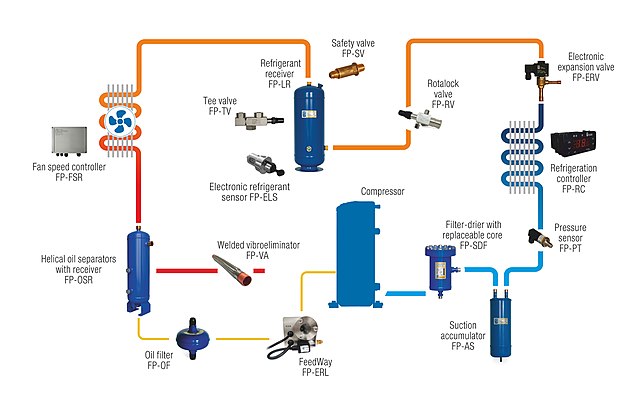Refrigerant sensors are the unsung heroes of your HVAC systems, refrigeration units, and car air conditioning systems. They quietly monitor and manage refrigerant levels, making sure everything’s running smoothly. And when something’s amiss? They’ll let you know. Today, we’re giving these invaluable devices the spotlight they deserve.

This work is licensed under a Creative Commons Attribution-ShareAlike 4.0 International License.
Table of Contents
Understanding Refrigerant Sensors
What is a Refrigerant Sensor?
So, what’s a refrigerant sensor exactly? Well, imagine a sentinel that stands guard, ever watchful, over your cooling systems. That’s essentially what a refrigerant sensor does. These handy devices monitor the levels of refrigerant in your systems and spring into action at the first sign of trouble. Smart, right?
How Does a Refrigerant Sensor Work?
Ever thought about how these little gadgets work their magic? No need for guesswork – we’ve got the answer for you. These sensors use a variety of technologies, including infrared, semiconductor, and electrochemical methods. Each technology with its own unique way of keeping an eye on things.
Types of Refrigerant Sensors
There’s no one-size-fits-all when it comes to these sensors. Different strokes for different folks, as they say. Let’s take a look at the three main types you’ll find in the market.
Infrared Refrigerant Sensors
Ever seen a spy movie where they use infrared to detect movements? Well, that’s sort of how infrared sensors work. They use light waves to monitor refrigerant levels. Fancy, huh?
Semiconductor Refrigerant Sensors
Then, we’ve got semiconductor sensors. They work a little differently, changing electrical resistance to keep tabs on refrigerant levels. No James Bond stuff here, but equally amazing!
Electrochemical Refrigerant Sensors
Lastly, there are electrochemical sensors. They use chemical reactions to monitor refrigerant levels. Think high school chemistry class, but way cooler and more practical.
Read more detailed articles on refrigerants here – Articles on Refrigerants: The Ultimate Guide to Understanding Them
Importance of Refrigerant Sensors
Safety and Environmental Protection
Do you care about safety? About protecting the environment? Then you’ve got another reason to appreciate refrigerant sensors. They help prevent refrigerant leaks, which can be harmful to both us and our environment. Cool and eco-friendly? Sounds like a win-win to us!
System Efficiency and Cost Savings
Who doesn’t love saving a bit of cash? Well, you can thank your refrigerant sensor for helping you with that. By ensuring your systems are running smoothly, these devices help prevent costly repairs and energy waste. Pretty great, right?
Applications of Refrigerant Sensors
HVAC Systems
Your home or office HVAC system? Yep, there’s probably a sensor hard at work there. They ensure you stay cool in the summer and warm in the winter. Not all heroes wear capes, indeed!
Refrigeration Units
Ever wonder why your refrigerator keeps your food fresh day in and day out? You guessed it – refrigerant sensors. They ensure the unit runs efficiently, saving you from unpleasant surprises.
Automobile Air Conditioning Systems
Nothing beats the feeling of cool air on a hot day, right? You can thank your car’s refrigerant sensor for that. It’s there, working tirelessly, to ensure you stay cool on the road.
Choosing the Right Refrigerant Sensor
Factors to Consider
So, how do you pick the right sensor for your refrigerant? Well, there are a few things to keep in mind. Sensitivity, types of refrigerants used, environmental conditions, and maintenance requirements are all key factors. The right choice depends on your specific needs and situation.
Sensitivity
The more sensitive a sensor, the better it is at detecting refrigerant levels. Makes sense, right? But remember, a more sensitive sensor might also require more maintenance. It’s a balance you’ll need to consider.
Types of Refrigerants
Not all refrigerants are created equal, and not all sensors can detect all types. Make sure your chosen sensor is compatible with the refrigerant you use. Sounds straightforward, but it’s a step you won’t want to skip!
Environmental Conditions
Think about where your sensor will be working. Will it be subjected to harsh conditions? If so, you’ll want a sensor that can withstand them. After all, a sensor is only good if it’s working, right?
Maintenance and Lifespan
Finally, consider maintenance requirements and the sensor’s expected lifespan. Can you commit to regular maintenance? How often will you need to replace the sensor? These are important factors to consider before making a decision.
Installation and Maintenance Tips
Once you’ve got your sensor, you’ll want to install and maintain it properly. Proper installation ensures it works correctly, and regular maintenance helps prolong its lifespan. Think of it as taking care of a tiny, very important pet.
Future Trends in Refrigerant Sensor Technology
The world of refrigerant sensors is ever-evolving. We’re seeing exciting trends like integration with the Internet of Things (IoT) and improvements in sensitivity and accuracy. The future’s looking bright, wouldn’t you say?
Conclusion
Refrigerant sensors may be small, but they sure are mighty. They keep our systems running smoothly, save us money, and protect the environment. And that, folks, is why we think they deserve a standing ovation!